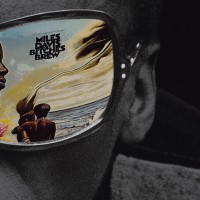I grew up listening to jazz. My father was an avid fan, and told stories of how he was shocked by a Miles Davis concert when he was my age: Miles performed the entire time with his back to the audience, without ever saying a word.
Despite my upbringing in jazz, and my dad’s recounting of his own Miles Davis experience, when I first listened to his 1970 album Bitches Brew my feelings toward it could be summed up by two simple words: intensity and confusion. The sonic chaos in the songs, the length of the album, the inclusion of a curse word in the title – all of it seemed to be Miles Davis provoking his audience into a reaction.
More than half a century later, he still does. Let’s revisit the cultural impact of Bitches Brew – and Davis himself – on both the music industry and American society from a current perspective.
Davis encharged Surrealist artist Mati Klarwein with the design and execution of the cover of Bitches Brew. In doing so, Davis alluded to an intention with his music to provoke the experience I underwent, in overwhelming and disrupting the rational understanding of his listener – notions at the core of Surrealist ideals. In fact, even Davis’ choices in the production of his album hint to the process of psychic automatism defined by Andre Breton, the father of the Surrealist movement, as essential to its philosophy.
Psychic automatism refers to the expression of the subconscious, free of restrictions stemming from morality or logic – a type of production achieved through rapid creation and removal of external filters. In Miles Davis’ recording of Bitches Brew, he did not provide any of the 14 musicians involved with sheet music or scores.
Instead, he pushed his players to tune into their instincts and spontaneously create new music beyond the boundaries of sound they were familiar with. Davis encouraged them to explore their imagination and pursuit of desire by removing the constraints of specific directives and the expectations of genre conventions. In doing so, he and his fellow musicians achieved an expression of his own subconscious through a sonic rendition of psychic automatism.
Just as Surrealism is revolutionary at its core due to its opposition to the world’s obsession with reason and norms, Miles Davis’ album was revolutionary in its shattering of the ideas surrounding the meaning of the jazz genre and the identity of jazz artists themselves. Davis incorporated the use of electric instruments in Bitches Brew, a sound traditional to rock ‘n’ roll and never seen in jazz before, propelling a breakdown of the distinction between genres.
By spearheading what later became known as fusion jazz, Davis rejected the labels of both jazz and rock ‘n’ roll, contending they were white categories applied to black music and consequently imposed white expectations on black artists. In rejecting the imposition of external labels, he continued a process of musical disruption by reclaiming both jazz and rock as unified by a Black musician to be “Black music,” as he described his own playing in a 1975 interview with Encore.
Despite working within a musical industry (including his label Columbia Records) that was composed of only white executives, while delving into rock (which at the time was mainly seen as a sell-out toward the white mainstream audience), Miles Davis was able to rise to the top and become one of the highest-paid jazz musicians in contemporary history. His popularity was due not only to his music, but also resulted from his envy-inducing persona as an emblem of coolness, characterized by his signature sunglasses and clothing style.
In fact, he rarely performed without his sunglasses: They both obscured his face, and created a physical barrier between Davis and his audience. This was part of his refusal to subject himself to others’ judgments and expectations. Instead, Davis’ desire was to play music as an expression of himself outside of an external gaze, rather than conforming.
Just as my dad experienced, it was typical of Miles Davis to perform without ever speaking to or looking at the audience. But he disregarded claims of arrogance during on-stage performances and extensive criticisms by white journalists or musicians. Instead, he was rejecting the role of an entertainer imposed on him as a black musician, just as he disregarded and consequently subverted jazz conventions. In this way, he ultimately enabled a reconstruction of what it truly meant to be a jazz artist and performer.
With the release of Bitches Brew, Miles Davis showcased a musical innovation that would alter the course and evolution of jazz for years to come. Despite Breton’s renowned aversion to music, Miles Davis’ production of the album – focusing on improvisation and freedom from instruction and norms – should be considered a sonic translation of his subconscious and an exemplification of the Surrealist process of psychic automatism.
Davis embraced his identity as a successful, popular black musician, despite toiling in an industry marked by consistent appropriation of jazz by white artists. At the same time, most publicity and commercial decisions were also made by white label executives. Still, he played to explore his own imagination and passions rather than just please an audience.
He completely disregarded and refused to conform to any expectations that were held for him as both an individual and artist, and in doing so produced a revolutionary sound – opening up a world of possibilities toward different, better realities.
Everyone should take an hour and 45 minutes to delve into a deeper listening experience of Bitches Brew. Become participatory in this surreal production, where the value of music becomes a revolutionary process. Or, as Miles Davis put it, just “hear it.”
- Why Miles Davis’ ‘Bitches Brew’ Remains Such a Revolutionary Work - March 14, 2021



